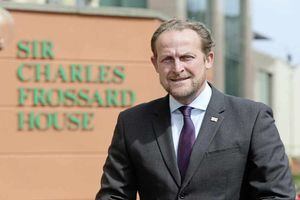Public sector automatic pay rise under review
TALKS will begin this year on ending public sector pay perks.

Matters up for discussion include automatic annual rises for staff as they move through their pay band, normally for between three and five years, and performance-related pay.
Between 2010 and 2015, States staff costs rose from £214.1m. to £242.7m., a 13% rise, or once inflation is taken into account, an increase of £3m. or 1.27%.
States chief executive Paul Whitfield said it knew that the public sector needed to be as lean as possible, but an annual turnover of 750 staff presented opportunities to reduce the size without expensive redundancies.
But he stressed also the importance of having the right people in the right places, so if more staff were needed in healthcare, they would be provided.
'That thinking led, in 2015, to us spending £6m. more on medical professionals than the year before, because that's where the need was. Going forward, we know there is no new money, so the cost of funding staff increases in some areas, such as social care and health, will need to come from savings made elsewhere.'
He said that pretty much all of the increase in staff costs between 2010 and 2015 could be accounted for by the increase in clinical staff put in place to address the findings of several independent reviews.
A review of terms and conditions across the public sector was a crucial piece of work, he said.
'We will be looking to open the conversation with union reps and directly with our staff during this year.
'Clearly effective engagement and communication will be important in how this work develops and therefore it is too soon to say with certainty what options will be looked at. However, areas for discussion could include the size and number of pay bands, incremental salary increases and the ability to better acknowledge performance.'
Last Wednesday, Policy & Resources president Deputy Gavin St Pier announced that the States had ended 2016 with a £15m. surplus. – the first since 2008 – although many of the factors that contributed to it were one-offs.





